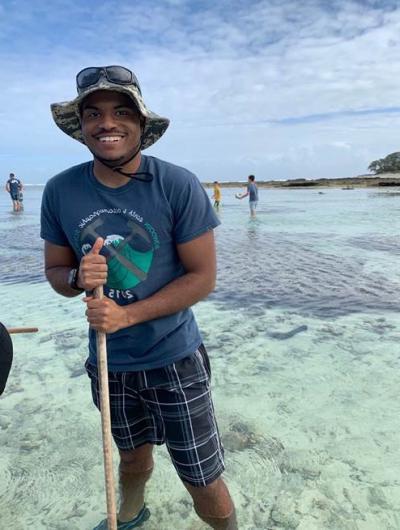EOS Professor Warns of Global Mining Crisis in Tropical Rivers

“Illegal mining has muddied tropical rivers worldwide,” 由 科学 reporter Paul Voosen, spotlights Dethier’s 研究 on the global effects of the precious metal mining industry on nearby rivers.
Dethier and his colleagues studied more than 400 regions where mining occurs, 主要在全球热带地区, revealing that mining debris clouds the water of roughly 7 percent of large tropical river stretches.
He collaborated on this work this fall with Peter Tomhave ’23, who mapped mining areas around the world and contributed to an analysis of mining's social ramifications. Tomhave will be a coauthor on a pending version of the 研究 article.
“Growing up in northern Minnesota—a region with deep ties to mining—I have had a longstanding interest in the environmental and economic impact of valuable resource extraction,我说过. “I feel very fortunate to work with Evan as a collaborator and mentor, as his wealth of knowledge expands far beyond the classroom.”
Scientists at Wake Forest University were also part of the 研究 team. 英里Sillman, professor of biology at Wake Forest and director of the university’s Center for Energy, 环境, 和可持续性, commented on the lack of awareness about mining. “It’s completely flown under the radar,” Silman told Voosen. “The pervasiveness was really shocking to me.”
As it turns out, there's quite a lot of mining going on in the world's rivers. Think California or Yukon Gold Rush, but all across the tropics. 多亏了 @voooos 一篇很棒的文章 @新闻from科学 我们正在进行的这方面的工作. http://t.co/In0WFz8USc
——埃文Dethier (@evandethier) 2023年1月12日
正在进行的研究中, Dethier and his colleagues examined over ten thousand satellite images of rivers. When they noticed locations that were especially muddy, 他们搜索了其他图像, 新闻媒体, and social media to get to the bottom of its causes. They ultimately found that 381 of these muddy sites were attributable to mining—a stark number.
“When we think about the effects of land use change, we usually think first about agriculture because of its enormous footprint,” Detheir said in a recent interview with a Bowdoin reporter. “Our work shows that mining in rivers uses significantly less land but has acute effects, 尤其是在小溪和河流上. And it's happening all over the world.”
Not only is river water suffering from the impacts of illegal mining, but so too are surrounding tropical ecosystems. Tropical ecologist Enrique Ortiz reported to Voosen that the high concentration of mud can make these tropical rivers uninhabitable for native species of fish—as well as undrinkable for other land animals. Dethier added that rivers can carry this dirt downstream for as much as 1,000 kilometers.
Dethier’s initial 研究—and that of others in his discipline—is especially relevant during a current “scaling up” of global mining activities, Sara Geenen说, associate professor of international development, 全球化, and poverty at the University of Antwerp.
A mix of factors is driving the increase. “Rising global financial and location insecurity, 黄金需求和价格不断上涨, and other more local factors all partially contribute to the global changes we observe,Dethier说.
Studies like Dethier's call attention to the effects of the mining industry—and the high price of precious metals—on tropical ecosystems. 最重要的是, it suggests a need for legislative action and regulation for mining practices, should lawmakers choose to act on 研究 findings.
“This is a global challenge with environmental, economic, and political implications. We think that our work highlights the scale and complexity of this challenge. But it's key to remember that millions of people around the world rely on mining for their livelihood,Dethier说. “We hope that we can contribute to solutions that protect both these workers and important ecosystems that are affected by mining.”


